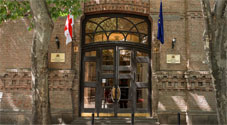
University tuition fee financing for the citizens of the occupied territories and the first day of Unified National Exams in Georgia
By Khatia Bzhalava
Tuesday, July 7
According to the Georgian government’s decision, University entrants living in the occupied regions of Georgia will be enrolled at the universities without passing Unified National Exams and the government will fully fund tuition fees.
As the Ministry of Education informs, residents of occupied territories who are unable to register for the Unified National Exams or are not eligible to enter the universities, will have the opportunity to enroll at a state-accredited higher education program.
“University entrants living in the occupied territories who have studied for the last two years and have received a general education certificate which is approved and recognised by the Ministry of Education, Science, Culture and Sports will be enrolled without passing Unified National Exams. Under these conditions, the temporary administrative-territorial unit of the Tskhinvali region and the Ministry of Education and Culture of the Autonomous Republic of Abkhazia will ensure the registration of those wishing to enroll and be financed.” The Ministry of Education said.
Also, Georgian University entrants living in Azerbaijani, who have registered for the 2020 Unified National Exams but due to the current situation are unable to enter the country in order to attend exams, will also be financed by the government. According to the Ministry, up to 70 University entrants will be financed based on this decision.
The 6th of July was the first day of Unified National Exams in Georgia. As the head of National Assessment & Examinations Center, Sopho Gorgodze stated to the journalists, the first day passed in a calm atmosphere. Examinees were able to remove masks while writing and if the room temperature reached 30 degrees, turning on the air conditioner was permitted( while the windows would be open as well). As Gorgadze said, reserve space, a place where students with temperature were supposed to be transferred was used only for 4 of the examinees county-wide. There were also two cases when based on the high temperature of the examinee and the decision of medics, they were not admitted to the exam and received a recommendation of taking PSR tests.


